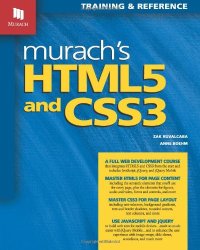
Ebook: Murach's HTML5 and CSS3
Author: Zak Ruvalcaba Anne Boehm
- Tags: Computer Science AI Machine Learning Bioinformatics Simulation Cybernetics Human Interaction Information Theory Robotics Systems Analysis Design Computers Technology Internet Groupware Telecommunications Networking Cloud Computing Languages Tools Ada Ajax Assembly Language Programming Borland Delphi C CSS Compiler Compilers DHTML Debugging Fortran Java Lisp Perl Prolog Python RPG Ruby Swift Visual Basic XHTML XML XSL ActiveX ASP NET Cold Fusion Server Pages JavaScript PHP Web Development Referen
- Year: 2011
- Publisher: Mike Murach & Associates
- Edition: 1
- Language: English
- pdf
Note: There is a newer edition of this book
HTML5 and CSS3 (the latest standards for HTML and cascading style sheets) are packed with coding options that make it easier than ever to create web pages with the features users want today, from an up-to-date look and feel...to immediate validation of user entries...to audio and video samplings. At the same time, there are still older browsers and millions of existing web sites that require you to integrate HTML5 and CSS3 features with the earlier standards. So how do you learn all this?
This book is exactly the practical approach you need. It teaches you how to use HTML5 and CSS3 the way they were meant to work, with HTML5 to provide the page content and CSS3 to format the content and lay out the pages. But it also teaches you how to use the HTML5 and CSS3 features alongside the earlier standards to ensure that your pages will work for the widest possible audience. So if you're going to be developing web pages...whether you're a web designer, a JavaScript programmer, a server-side programmer, or a rookie...this book is for you.
It begins with a 6-chapter, quick-start course to get you working at the professional level right away. Soon, you'll be using HTML5 features...like the semantic tags that improve the structure of your content and your search engine rankings...along with CSS3 features...like text and border shadows, rounded corners, and background gradients that give your pages a cutting-edge feel. And you'll know how and when to blend them with the earlier HTML and CSS code.
After that quick-start, you'll learn how to make your pages work better for your site visitors by enhancing them with audio and video files...using the jQuery Mobile library to deliver content on mobile devices...adding jQuery routines for special effects like slide shows and accordions...and using JavaScript to provide for features like geolocation, web storage, canvas, and drag-and-drop...the kinds of skills that go far beyond what you'll find in other introductory books.